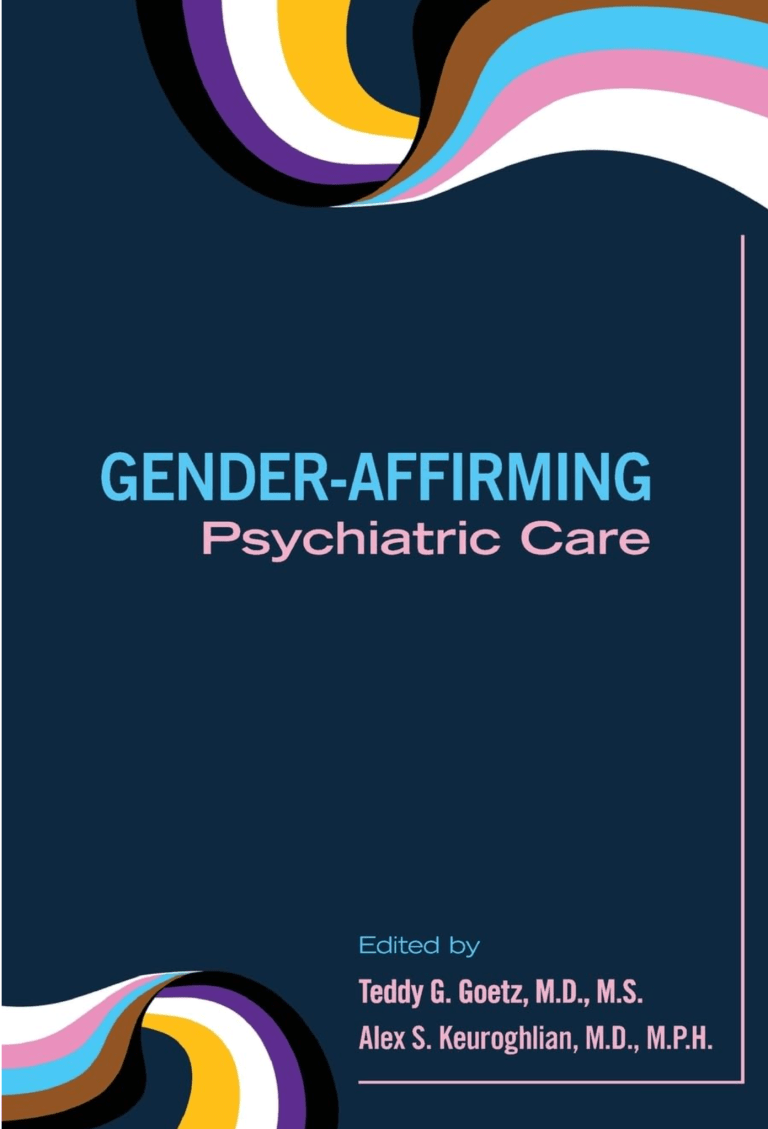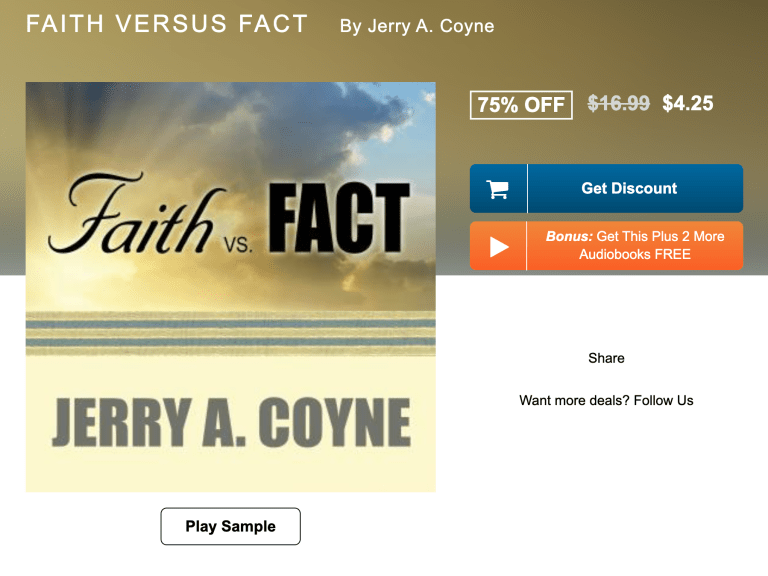From the Washington Monthly we hear of a brand-new book published by the prestigious American Psychiatric Association (APA), a book dealing with (and all gung ho for) “gender-affirming” care. You know what that is: it’s the care that goes to a child with gender dysphoria, taking him or her directly to a therapist or doctor who affirms the child’s feelings of being born in the “wrong” body, then to prescribing puberty blockers and other hormones, and, then if the patient wants it, to excision of body parts: operations on genitalia and removal of breasts, along with hormone treatment that eliminates a patient’s ability to have an orgasm.
Click below see the book on Amazon. It’s $58 and, as you see below it, the 18 ratings on Amazon so far aren’t very laudatory. But according to Amazon it came out only on January 7, and the gender activists haven’t yet weighed in. But they will after they read psychiatrist Sally Satel‘s critical take.
x
Why such poor reviews? Perhaps, as Sally notes in her description of the book in Washington Monthly, because it’s written by gender-affirming advocates and is woefully short on warnings about possible dangers of this kind of medical and psychiatric care. Nor does it appear to offer any alternative care that doesn’t wind up with hormone therapy.
Click to read:
Although the book is published by the APA, it doesn’t constitute “official APA guidance.” But here’s psychiatrist Sally Satel’s take (excerpts indented, bolding is mine):
Last fall, the APA’s publishing arm issued a textbook called Gender-Affirming Psychiatric Care. Described in accompanying promotional material as an “indispensable” resource, the book is written for mental health and primary care clinicians. The publisher, American Psychiatric Association Publishing, APPI, hails it as “the first textbook in the field to provide an affirming, intersectional, and evidence-informed approach to caring for transgender, non-binary, and/or gender-expansive (TNG) people.”
The “affirming, intersectional” textbook is not official APA guidance. Still, APA Publishing describes it as “rigorous” and “an expert view from fields that include psychiatry, psychology, social work, nursing, pharmacy, public health, law, business, community activism, and more. And because each of the 26 chapters features at least one TNG author, wisdom gleaned from lived experience bolsters the professional perspective provided throughout the book.” One would hope that “lived experience” might enhance the scholarship, but that is not the case here.
Affirming care for children with gender dysphoria, a condition that, according to the APA, refers to individuals who suffer from “a marked incongruence between one’s experienced/expressed gender and assigned gender [at birth],” is a major subject of the book. Unfortunately, though billed as a compendium of “best practices,” Gender-Affirming Psychiatric Care, instead of providing even-handed analyses of the controversies within a still-evolving topic of great clinical and social importance regarding the science of treating gender dysphoric youth, the volume approaches it as a settled matter when it is not.
The textbook’s treatment philosophy is that if a child or teen desires transitional steps, then the physicians should proceed, taking the patient’s request on its face. According to the authors, “Clinicians should … always allow patients autonomy in their care.” The authors further advocate for puberty blockers (chemicals that suppress the natural hormonal development and the appearance of secondary sexual traits) and then cross-sex hormones (estrogen or testosterone) to produce the physical characteristics aligned with the patient’s gender identity.
When it comes to gender-affirming surgery (which, for natal girls, can entail the removal of breasts, uterus, and ovaries, as well as penile construction; and for natal boys, involves the genital removal and the creation of a vaginal canal), patients first require a psychiatric evaluation before surgical consultation. In this evaluation, the authors say that “the [mental health] clinician should never place barriers to surgery, only identify those that exist and assist with overcoming them.” (Emphasis added.) While the final decision to operate ultimately lies with the surgeon, who is tasked with obtaining informed consent from the patient and guardian, a psychiatric greenlight is also necessary. Surely, there are times when a yellow or red light is appropriate. It’s telling that a book of 420 pages only mentions guardians once and in the context of saying that guardians and parents (who get five mentions) should not be part of decisions concerning their transitioning kids’ medical data. Parents are referenced only in the context of being unsupportive to their children’s desire to transition.
Satel has other beef. The book doesn’t cover the fate of youths who aren’t given this kind of care, many of whom become gay or no longer gender-dysphoric without affirmative treatments; the book doesn’t cover those who de-transition or reverse the process when it’s going on before medical treatment (“desisters”); the book doesn’t describe alternative treatments in which therapists don’t automatically buy into the patient’s wishes and narratives; and, most important, and, most important, the book doesn’t warn of the potential dangers of some of the medical treatments—dangers recognized by other Western countries.
First is the need for more objective care:
As a practicing psychiatrist, I would expect this volume to probe how to conduct productive interviews with all patients, especially children and young teens, who consider themselves candidates for a gender-affirming approach. After all, this is a book from the American Psychiatric Association’s publishing arm. As such, it should advise clinicians to examine, over many sessions, patients’ experiences and developmental struggles (such as emerging sexuality and identity formation), to learn about their home lives and social worlds, as well as to treat them for the frequent co-occurring issues, such as depression, anxiety, and posttraumatic stress disorder, which sometimes manifest as gender dysphoria in youth.
This would seem to be at the heart of any responsible psychiatric assessment of whether chemical intervention (which can be irreversible) and procedures as life-altering as “confirmation surgery” should be recommended. However, oddly, such foundational steps are ignored.
Here’s Satel on the lack of discussion of the dangers of affirmative therapy (again, we’re talking about young people who may not be mature enough to make such important decisions). To me, this almost verges on academic malpractice:
Finally, a reader gets no sense that gender-affirming care is the subject of vigorous international scientific debate. Remarkably, the textbook does not mention that in 2020, the United Kingdom’s National Health Service commissioned a comprehensive review of puberty blockers and cross-sex hormones and concluded that “the available evidence was not deemed strong enough to form the basis of a policy position” on their use. Similarly, in 2022, Sweden’s National Board of Health and Welfare suspended hormone therapy for minors except in very rare cases and limited mastectomies to research settings. Likewise, the Norwegian Healthcare Investigation Board now defines all medical and surgical interventions for youth as “experimental treatment,” and the French National Academy of Medicine advises caution in pediatric gender transition.
Regardless of the authors’ personal views, a textbook that is advertised as “rigorous—and timely” as well as “informative” should, at the very least, acknowledge, and ideally explore, the tension between the European and American approaches and elucidate the concerns raised by European medical authorities.
Why the lacunae? As Satel notes, every chapter has at least one likely gender-activist author (“TNG”), and this has resulted in the sorry situation where the APA gives its imprimatur to treatment that might be dangerous or, at best, ineffective. Do note, however, that Satel also opposes state-imposed bans or limits on treatment for adults.
Gender activism is one thing, but when it comes with the imprimatur of the APA and without mention of either alternative therapies nor warnings about the dangers of medical care that have been recognized by other countries, that activism is irresponsible.
The worst thing one can say about this book is that it’s probably going to be highly recommended by ACLU lawyer Chase Strangio.























